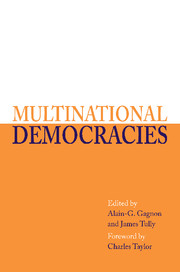Book contents
- Frontmatter
- Contents
- Notes on the contributors
- Foreword by Charles Taylor
- Acknowledgements
- Introduction
- Part I Justice and stability in multinational democracies
- Part II Struggles over recognition and institutions of accommodation
- Part III Modes of reconciliation and conflict management
- References
- Index
Foreword by Charles Taylor
Published online by Cambridge University Press: 06 October 2009
- Frontmatter
- Contents
- Notes on the contributors
- Foreword by Charles Taylor
- Acknowledgements
- Introduction
- Part I Justice and stability in multinational democracies
- Part II Struggles over recognition and institutions of accommodation
- Part III Modes of reconciliation and conflict management
- References
- Index
Summary
This excellent collection explores important new ground. The authors of these chapters examine the constitutive tensions at the heart of contemporary democratic societies.
These societies are in fact the site of two opposite tendencies. On the one hand, they require a new kind of unity and homogeneity which earlier, autocratic or hierarchical societies never needed. On the other hand, they are becoming more and more diverse. The need for unity comes from the conditions of legitimacy which belong to a democratic society. We can see this in a number of ways, three of which are especially evident.
First, democratic societies construe the ensemble of citizens as a ‘people’; that is, as a unit of deliberation and decision. Yet, in order to sustain what can be recognized as a common deliberation, a people has to have a minimal common focus, a set of agreed goals, or principles, or concerns, about which they can debate, argue and struggle. Once they drift apart, with different segments focusing on different things, it becomes hard to construe the upshot as the answer to a common question. But then this upshot begins to lose legitimacy for those who no longer see it as the answer to their question.
If a minority, for instance, comes to see the majority as concerned exclusively for its good, rather than that of the whole, they will begin to feel that they are no longer included in this ‘people’.
- Type
- Chapter
- Information
- Multinational Democracies , pp. xiii - xvPublisher: Cambridge University PressPrint publication year: 2001
- 2
- Cited by



